人教版九年级英语上册第4单元知识点梳理
- 格式:pdf
- 大小:669.47 KB
- 文档页数:7

人教版九年级英语上册unit4知识点Unit 4: Our Great LeadersIntroductionIn the ninth-grade English textbook of the People's Education Press, Unit 4 revolves around introducing students to the influential leaders who have shaped our world. This unit focuses on historical figures who have made significant contributions in various fields. By studying these leaders, students gain insights into the qualities required to become great leaders themselves.Biography of Steve JobsSteve Jobs is a renowned name in the field of technology. Born on February 24, 1955, in San Francisco, California, Jobs co-founded Apple Inc. and revolutionized the world of personal computing. His visionary ideas and relentless pursuit of perfection led to the creation of groundbreaking products like the iPhone, iPad, and MacBook.Jobs's success can be attributed to his unique leadership style. He possessed strong determination and never settled for mediocrity. Jobshad an eye for detail and demanded perfection from his team. He inspired his employees to think differently and pushed them to achieve the impossible. Under his leadership, Apple became one of the most valuable companies in the world.Biography of Wangari MaathaiWangari Maathai, the first African woman to receive the Nobel Peace Prize, was born on April 1, 1940, in Kenya. She dedicated her life to environmental conservation and social justice. Maathai founded the Green Belt Movement, an organization focused on empowering women through tree planting initiatives. This movement not only helped restore Kenya's forests but also brought economic opportunities to local communities.Maathai's leadership style was centered around empowering others. She believed that change starts at a grassroots level and encouraged individuals to take responsibility for their environment. Through her efforts, Maathai proved that even a single person can make a significant impact on society.Biography of Elon MuskElon Musk, a modern-day innovator, was born on June 28, 1971, in Pretoria, South Africa. He is known for his ventures in the fields of electric vehicles (Tesla), space exploration (SpaceX), and renewable energy (SolarCity). Musk's ambitious goals, such as colonizing Mars and creating sustainable energy solutions, have pushed the boundaries of human achievement.Musk's leadership style is characterized by his determination and risk-taking mindset. He is not afraid to confront challenges head-on and encourages his team to think outside the box. Musk's ability to envision future possibilities and inspire others to work towards those goals has made him a role model for aspiring leaders.ConclusionStudying the lives of great leaders like Steve Jobs, Wangari Maathai, and Elon Musk provides invaluable lessons for young students. These individuals exemplify qualities such as determination, innovation, and the ability to empower others. By learning from their experiences, students can develop their own leadership skills and strive to make a positive impact on the world. The knowledge gained from Unit 4 will not only shape their understanding of history but also inspire them to become leaders in their respective fields.。

人教版九年级英语第四单元Unit 4 Section A+B知识点精讲单词Section A1. humorous /'hju:mərəs / adj.有幽默感的;滑稽有趣的助记humor(n.幽默)+ous(形容词后缀)=humorous典例He is a very kind and rather humorous man.他是一个非常善良并且相当有幽默感的人。
a humorous character in a play一部戏剧中一个滑稽的角色常用词缀-ous为形容词后缀,通常放在名词后,表示“……的”。
如: danger(危险)→dangerous(危险的); mountain(山) →mountainous(多山的); courage(勇气)→courageous(勇敢的); poison(毒)→ poisonous(有毒的)。
2. silent /'saɪlənt / adj.不说话的;沉默的助记把丝(si)都借(lent)出去了,这下沉默了典例They huddled together in silent groups.他们群群地围在一起,默不作声。
短语keep silent保持沉默联想silence n.寂静;无声3. helpful /'helpfl/ adj.有用的;有帮助的助记*help(n.&.帮助)+-ful(形容词后缀)=helpful典例a helpful map一张有用的地图She is a helpful girl.她是一个乐于助人的女孩。
短语be helpful to对……有帮助联想help v.&n.帮助常用词缀形容词后缀-ful通常位于既可用作动词也可用作名词的单词后,常见的词有use→ useful(有用的); thank→ thankful(感激的);care→ careful(细心的)等。
4. score /skɔː(r)/ n.&v.得分;进球助记sore(疼痛的)中间加个c,得分/进球光疼是不够的。

九上英语人教版第四单元知识点一、重点单词。
1. humorous.- 形容词,意为“有幽默感的;滑稽有趣的”。
例如:The teacher is very humorous and we all like his classes.(这位老师很幽默,我们都喜欢他的课。
)- 其名词形式是“humor”,意为“幽默”。
2. silent.- 形容词,“不说话的;沉默的”。
例如:He remained silent all the time.(他一直保持沉默。
)- 相关短语“keep silent”(保持沉默)。
其名词形式是“silence”,例如:The silence in the room made me nervous.(房间里的寂静让我紧张。
)3. helpful.- 形容词,“有用的;有帮助的”。
例如:This book is very helpful for my study.(这本书对我的学习很有帮助。
)4. score.- 作名词时,意为“得分;进球”。
例如:His score in the math test is very high.(他在数学考试中的分数很高。
)- 作动词时,意为“得分;进球”。
例如:He scored two goals in the football match.(他在足球比赛中进了两个球。
)5. background.- 名词,“背景”。
例如:His family background is very ordinary.(他的家庭背景很普通。
)6. interview.- 作名词时,“面试;访谈;采访”。
例如:I have an interview tomorrow.(我明天有一个面试。
)- 作动词时,“采访;面试;对……进行面谈”。
例如:The reporter interviewed the famous singer.(记者采访了那位著名的歌手。
)7. dare.- 作实义动词时,意为“敢于;胆敢”,有人称和数以及时态的变化,后接动词不定式。

Unit 4 I used to be afraid of the dark知点解1. from time to time常;有,和sometimes, at times 是同表达。
常的 time 短有:what time 几点for the first time第一次all the time一直,是;at times 不,有in time及;on time 按,准at the same time 同have a good/great/wonderful time 玩得开心3.It ’ s been three years since we last saw our primary school classmates.It has been+一段 +since+含有去式的述句“自⋯ 以来已多了”. 我在里工作已有一个半月了。
1、 I’m looking after Tom today. He ’s been in my house ________ 8:00 this morning.A. atB.sinceC.forD.till2、 Shared bikes, which are environmentally friendly, _____ quite popular among big cities in China since last April.A.becameB.have becomeC.will become3、 ---Where is Jane?---I don ’tknow. I ________ her since yesterday morning.A. haven’tseenB.didn ’tseeC.won’tsee4、 Since we began to use the Internet, our lives _________ a lot.A. changeB.had changedC.will changeD.have changed4. I used to see him reading in the library every day.see sb. do sth . 看某人做了某事指整个程即:指作常生或完成。

人教版九年级上册第四单元语法知识点梳理Unit 4:I used to be afraid of the dark.第四单元的语法重点是:used to的用法;if引导条件状语从句;few和little。
used to的用法:used to是一个固定结构,意为“过去经常;以前常常”,其后接动词原形。
它表示过去存在某种状态或者过去的某种经常性、习惯性的行为或者动作。
★其用于肯定句的结构为:主语+used to+动词原形+其他。
如:I used to play ping-pong with my brother.过去我常常和我哥哥一起打乒乓球。
★其用于否定句的结构为:主语+didn't+use to+动词原形。
如:You didn't use to like action movies.你过去不喜欢动作片。
★其用于一般疑问句的结构为:Did+主语+use to+动词原形+其他?如:Did your sister use to be shy?你的妹妹过去害羞吗?【辨析:】be used to(doing)sth意为“习惯于(做)某事”,to后可接名词、代词或动名词。
如:The students are used to the new teacher now.学生们现在习惯这个新老师了。
They are used to raising their hands first when they want to ask questions.他们习惯了问问题前先举手。
if引导条件状语从句:★if引导的非真实性条件状语从句即虚拟语气,通过动词形式的变化来表示说话人对发生的动作或存在的状态所持的态度或看法的动词形式称为语气,虚拟语气表示说话人所说的话不是事实,而是一种祝愿,建议或是与事实相反的假设等。
★if引导的条件状语从句分为真实和非真实条件句,非真实条件句应用虚拟语气。
如果要表示与现在或将来事实相反时,其虚拟语气结构为:句型条件从句主句谓语动词形式动词过去式(be动词用were)would动词原形即:(从句)if主语+动词过去式(be动词用were),一般过去时(主句)主语+would+动词原形过去将来时。

英语九年级上人教新课标unit4 知识汇总一.used to 去曾pay for (sth.)付、支付find out 找到、提出(答案、解决的方法)think of 、想起get ⋯back 退⋯、送回pick up 起have a tryall over 遍布large number of 多no matter 不both ⋯ and 二者都give up 放弃ever since 从那起、今后向来so far 到当前止come trueslow down 减、减速be proud of 以骄傲not only ⋯ but also 不⋯并且be afraid of 惧怕cut down 砍倒as soon as possible 尽可能快的keep on doing sth. 向来做某事one-way 程的be amazed at ⋯感觉惊clean up 消除、整理干as long as 达on earth 终究practise doing sth. 做某事What a pity! 多惋惜!take part in 参加because of 因二.要点句型及用法1.Have you got any brothers or sisters?2.She used to be a history teacher.3.One day the librarian came up with an idea.4.No matter what the weather is like you can always find surfers out riding the waves.5.Whenever someone throws in some rubbish, it produces a piece of music.6.It ’ s a pleasant way to help keep our city clean.7.Taking care of our vironment is very important.8.It ’ s our duty to keep our environment clean and tidy.9.The more trees, the better.10.Make sure that all of the rubbish goes into the dustbin.11.I hope to see you as soon as possible.12.I ’ m free except today.13.In the south of the island, there is scuba diving, fishing and boating.14.It takes about twelve hours if you take k37 train.15.That ’ s a deal.三. 考点:1.pay, cost, spend, takeA. pay v. ⋯ 酬, pay for ⋯付款pay money for 花⋯B.cost 某物花(某人)多少The new radio cost her twenty yuan.C. spend 指花和金I usually spend 300 yuan on newspapers every year.Tom spent one hour playing football yesterday.D.take 做某事花(某人)多少It takes us twenty minutes to write down the new words.ed to, be used toWhen I was a child, I used to climb that hill.We are used to the weather here.我已适了的天气。
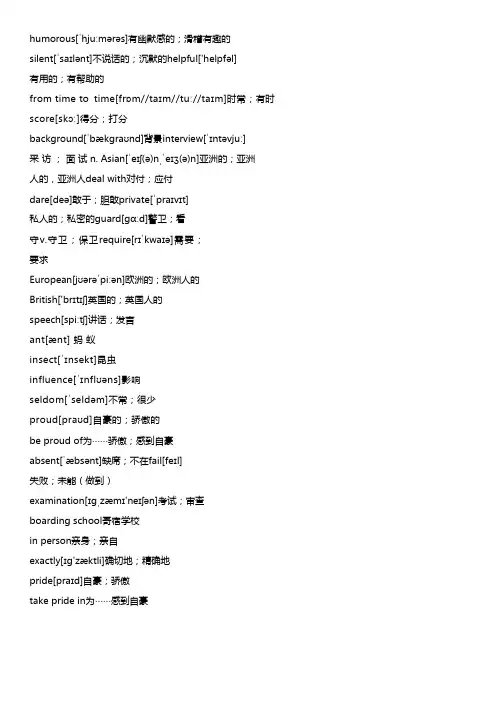
humorous[ˈhjuːmərəs]有幽默感的;滑稽有趣的silent[ˈsaɪlənt]不说话的;沉默的helpful['helpfəl]有用的;有帮助的from time to time[frɒm//taɪm//tuː//taɪm]时常;有时score[skɔː]得分;打分background[ˈbækɡraʊnd]背景interview[ˈɪntəvjuː]采访;面试 n. Asian[ˈeɪʃ(ə)nˌˈeɪʒ(ə)n]亚洲的;亚洲人的,亚洲人deal with对付;应付dare[deə]敢于;胆敢private[ˈpraɪvɪt]私人的;私密的guard[ɡɑːd]警卫;看守v.守卫;保卫require[rɪˈkwaɪə]需要;要求European[jʊərəˈpiːən]欧洲的;欧洲人的British['brɪtɪʃ]英国的;英国人的speech[spiːtʃ]讲话;发言ant[ænt]蚂蚁insect[ˈɪnsekt]昆虫influence[ˈɪnflʊəns]影响seldom[ˈseldəm]不常;很少proud[praʊd]自豪的;骄傲的be proud of为⋯⋯骄傲;感到自豪absent[ˈæbsənt]缺席;不在fail[feɪl]失败;未能(做到)examination[ɪgˌzæmɪ'neɪʃən]考试;审查boarding school寄宿学校in person亲身;亲自exactly[ɪg'zæktli]确切地;精确地pride[praɪd]自豪;骄傲take pride in为⋯⋯感到自豪grandson[ˈɡrændsʌn]孙子;外孙general[ˈdʒenər(ə)l]普遍的;常规的;总的将军introduction[ɪntrəˈdʌkʃ(ə)n]介绍Paula 葆拉(女名)Alfred 艾尔弗雷德(男名)Billy 比利(男名)Candy 坎迪(女名)Jerry 杰里(男名);杰丽(女名)Emily 埃米莉(女名)02 U n i t 4 知识梳理Unit4 I used to be afraid of the dark.【重点短语】ed to do 过去常常做2.deal with 对付应付3.be proud of 为……骄傲,感到自豪4.take pride in 为……感到自豪5.fromtime to time 时常,有时6.i n public 公开地7.i n person 亲身,亲自8.t ake up sth 开始做,接受,占用9.not……anymore不再10.worry about 为……担忧11.hang out 闲逛12.thinkabout 考虑13.be alone 独处14.on the soccer team 在足球队15.no longer 不再16.make a decision 做决定17.to one’s surprise 令某人吃惊的是18.even though 尽管19.pay attention to 对……注意,留心20.in the last few years 在过去的几年里21.be afraid of 害怕22.turn red 变红23.tons of attention 很多关注24.be careful 当心25.give up 放弃26.a very small number of …极少数的……27.give a speech 作演讲28.all the time 一直总是29.be interested in 对……感兴趣30.change one’s life 改变某人的生活31.take care of 照顾32.one of…, ……之一【重点句型】1. I used to be afraid of the dark. 我过去常常前害怕黑暗.2.I go to sleep with my bedroom light on. 我开着卧室的灯睡觉.3.I used to spend a lot of time playing games with my friends. 以前我常常花很多时间和我的朋友们玩游戏.4.I hardly ever have time for concerts.我几乎没有时间去听音乐会.5.My life has changed a lot in the last few years.我的生活在过去几年里改变了很多.6.It will make you stressed out.那会使你紧张的.7.It seems that Yu Mei has changed a lot.玉梅似乎变化很大.03词汇精讲1.silentsilent是形容词,意为“沉默的;无言的”,其名词形式为silence。
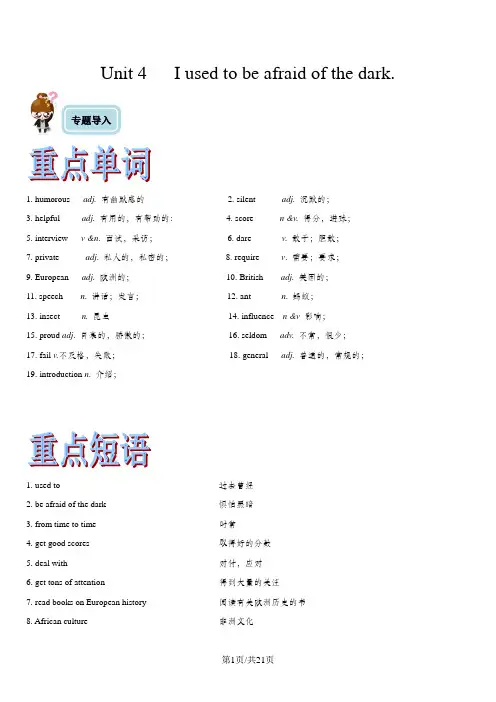
Unit 4 I used to be afraid of the dark.专题导入1. humorous adj.有幽默感的2. silent adj.沉默的;3. helpful adj.有用的,有帮助的:4. score n &v.得分,进球;5. interview v &n. 面试,采访;6. dare v.敢于;胆敢;7. private adj. 私人的,私密的;8. require v. 需要;要求;9. European adj.欧洲的;10. British adj.英国的;11. speech n. 讲话;发言;12. ant n. 蚂蚁;13. insect n.昆虫14. influence n &v影响;15. proud adj. 自豪的,骄傲的;16. seldom adv.不常,很少;17. fail v.不及格,失败;18. general adj. 普通的,常规的;19. introduction n. 介绍;1. used to 过去曾经2. be afraid of the dark 惧怕黑暗3. from time to time 时常4. get good scores 取得好的分数5. deal with 对付,应对6. get tons of attention 得到大量的关注7. read books on European history 阅读有关欧洲历史的书8. African culture 非洲文化9. be alone 独处10. give a speech in public 作一个公开演讲11. paint pictures 画画12. be nervous about tests 对考试感到紧张13. influence his way of thinking 影响他的思维方式14. be proud of ./take pride in 为…感到骄傲15. be absent from classes 逃课16. fail the examinations 考试不及格17. make a decision 下决心18. talk with sb in person 亲自找某人谈话19. to one’ surprise 使某人惊讶的是20. feel good about oneself 对自己充满信心21. a general self-introduction 一个简要的自我介绍22. in the last few years 在最近几年23. remain silent 保持沉默24. have a great influence on sb 对某人有很大的影响知识点梳理Section A1. be interested in对……感兴趣该短语后接动词-ing形式、名词或代词,其主语必须是人或其他有生命的东西。
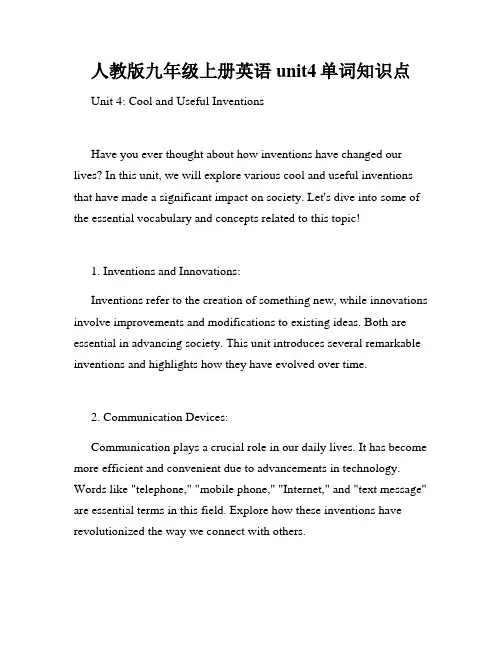
人教版九年级上册英语unit4单词知识点Unit 4: Cool and Useful InventionsHave you ever thought about how inventions have changed our lives? In this unit, we will explore various cool and useful inventions that have made a significant impact on society. Let's dive into some of the essential vocabulary and concepts related to this topic!1. Inventions and Innovations:Inventions refer to the creation of something new, while innovations involve improvements and modifications to existing ideas. Both are essential in advancing society. This unit introduces several remarkable inventions and highlights how they have evolved over time.2. Communication Devices:Communication plays a crucial role in our daily lives. It has become more efficient and convenient due to advancements in technology. Words like "telephone," "mobile phone," "Internet," and "text message" are essential terms in this field. Explore how these inventions have revolutionized the way we connect with others.3. Transportation Advancements:The transportation sector has seen significant improvements throughout history. From the invention of the wheel to the development of electric vehicles, transportation has become faster and greener. Essential terms such as "airplane," "bicycle," "subway," and "spacecraft" will help us better understand this area.4. Medical Breakthroughs:Medical inventions have saved countless lives and transformed healthcare practices. Recognize terms such as "vaccine," "antibiotics," "MRI," and "prosthetics." Discover how these innovations have extended human lifespan and enhanced the quality of life.5. Environmentally Friendly Inventions:With rising environmental concerns, the importance of eco-friendly inventions cannot be overlooked. Terms such as "solar energy," "wind power," "recycling," and "biodegradable" are crucial in this context. Learn how these inventions contribute to a sustainable future.6. Everyday Household Inventions:Our homes are filled with various inventions that make our lives more comfortable and efficient. Terms such as "refrigerator," "washingmachine," "microwave," and "dishwasher" are essential when discussing daily household tasks. Explore how these inventions have simplified our daily routines.7. Entertainment and Multimedia:Entertainment has evolved with the advent of new technologies. Terms like "television," "video game," "virtual reality," and "streaming" have become integral to our leisure activities. Discover how these inventions have shaped our entertainment preferences.8. Technological Advancements:Technology is rapidly advancing, bringing about transformative changes in society. Familiarize yourself with terms such as "robotics," "artificial intelligence," "augmented reality," and "nanotechnology." Explore how these advancements are shaping various industries.9. Patents and Copyrights:Protecting the rights of inventors is crucial to encourage innovation and creativity. Understand the terms "patent" and "copyright" and their significance in safeguarding intellectual property. Learn how inventors can secure their innovative ideas.In conclusion, this unit explores a wide range of inventions that have significantly impacted our lives. By understanding the vocabulary and concepts related to these inventions, we gain a deeper appreciation for the constant progress in various fields. As we continue to innovate, who knows what remarkable inventions the future holds?。
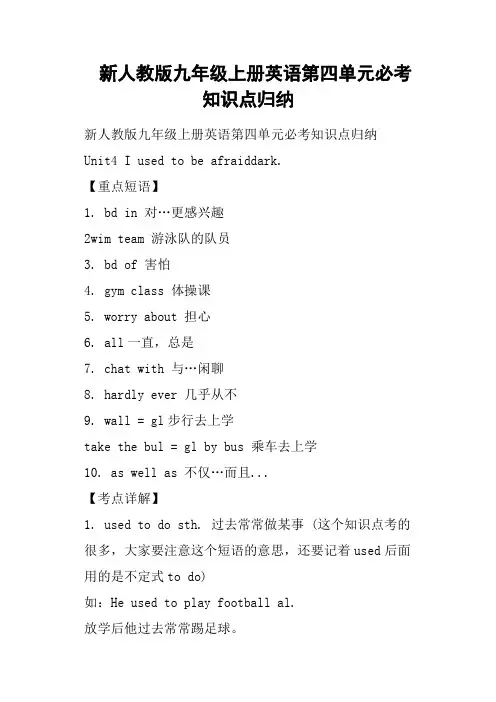
新人教版九年级上册英语第四单元必考知识点归纳新人教版九年级上册英语第四单元必考知识点归纳Unit4 I used to be afraiddark.【重点短语】1. bd in 对…更感兴趣2wim team 游泳队的队员3. bd of 害怕4. gym class 体操课5. worry about 担心6. all一直,总是7. chat with 与…闲聊8. hardly ever 几乎从不9. wall = gl步行去上学take the bul = gl by bus 乘车去上学10. as well as 不仅…而且...【考点详解】1. used to do sth. 过去常常做某事 (这个知识点考的很多,大家要注意这个短语的意思,还要记着used后面用的是不定式to do)如:He used to play football al.放学后他过去常常踢足球。
2. plaano 弹钢琴(play后面如果跟西洋乐器,大家记住,中间要加the,如果是中国乐器,不加the,如:play erhu)3. ①bd对…感兴趣②bd in doing sth. 对做…感兴趣(对于这两个用法大家一定要掌握,切记切记)如:Hd in math, bu'd in speaking English. 他对数学感兴趣,但是他对说英语不感兴趣。
d adj. 感兴趣的,指人对某事物感兴趣,往往主语是人g adj.有趣的,指某事物/某人具有趣味,主语往往是物(对于d和g要区分清楚,一个主语往往是人,一个主语往往是物)5. bd害怕…… 如:I addog.bd of doing sth. 害怕做…… 如:I ad of speakingd 动词,表示“花费金钱、时间”(spend和pay for它们的主语都是人,这一点大家要清楚)①spend…在某事上花费(金钱、时间)(重要考点)②spend…(in)doing sth. 花费(金钱、时间)去做某事(重要考点,尤其要注意动名词,也就是动词的ing 形式)如:He spends too mulothes. 他花费太多的时间在衣着上。
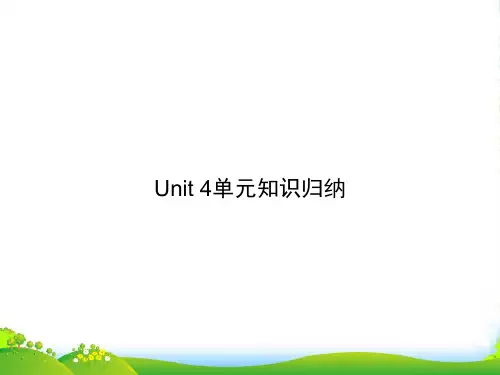
人教版九年级英语上Unit4单词、知识梳理、词汇句式精讲一、Unit4 单词humorous [ˈhjuːmərəs] 有幽默感的;滑稽有趣的silent [ˈsaɪlənt] 不说话的;沉默的helpful ['helpfəl] 有用的;有帮助的from time to time [frɒm//taɪm//tuː//taɪm] 时常;有时score [skɔː] 得分;打分background [ˈbækɡraʊnd] 背景interview [ˈɪntəvjuː] 采访;面试n.Asian [ˈeɪʃ(ə)nˌˈeɪʒ(ə)n] 亚洲的;亚洲人的,亚洲人deal with 对付;应付dare [deə] 敢于;胆敢private [ˈpraɪvɪt] 私人的;私密的guard [ɡɑːd] 警卫;看守v.守卫;保卫require [rɪˈkwaɪə] 需要;要求European [jʊərəˈpiːən] 欧洲的;欧洲人的British ['brɪtɪʃ] 英国的;英国人的speech [spiːtʃ] 讲话;发言ant [ænt] 蚂蚁insect [ˈɪnsekt] 昆虫influence [ˈɪnflʊəns] 影响seldom [ˈseldəm] 不常;很少proud [praʊd] 自豪的;骄傲的be proud of 为⋯⋯骄傲;感到自豪absent [ˈæbsənt] 缺席;不在fail [feɪl] 失败;未能(做到)examination [ɪgˌzæmɪ'neɪʃən] 考试;审查boarding school 寄宿学校in person 亲身;亲自exactly [ɪg'zæktli] 确切地;精确地pride [praɪd] 自豪;骄傲take pride in 为⋯⋯感到自豪grandson [ˈɡrændsʌn] 孙子;外孙general [ˈdʒenər(ə)l] 普遍的;常规的;总的将军introduction [ɪntrəˈdʌkʃ(ə)n] 介绍Paula 葆拉(女名)Alfred 艾尔弗雷德(男名)Billy 比利(男名)Candy 坎迪(女名)Jerry 杰里(男名);杰丽(女名)Emily 埃米莉(女名)二、Unit4 知识梳理Unit4 I used to be afraid of the dark.【重点短语】ed to do 过去常常做2.deal with 对付应付3.be proud of 为……骄傲,感到自豪4.take pride in 为……感到自豪5.from time to time 时常,有时6.in public 公开地7.in person 亲身,亲自8.take up sth 开始做,接受,占用9.not……anymore 不再10.worry about 为……担忧11.hang out 闲逛12.think about 考虑13.be alone 独处14.on the soccer team 在足球队15.no longer 不再16.make a decision 做决定17.to one’s surprise 令某人吃惊的是18.even though 尽管19.pay attention to 对……注意,留心20.in the last few years 在过去的几年里21.be afraid of 害怕22.turn red 变红23.tons of attention 很多关注24.be careful 当心25.give up 放弃26.a very small number of …极少数的……27.give a speech 作演讲28.all the time 一直总是29.be interested in 对……感兴趣30.change one’s life 改变某人的生活31.take care of 照顾32.one of…, ……之一【重点句型】1. I used to be afraid of the dark.我过去常常前害怕黑暗.2.I go to sleep with my bedroom light on.我开着卧室的灯睡觉.3. I used to spend a lot of time playing games with my friends.以前我常常花很多时间和我的朋友们玩游戏.4. I hardly ever have time for concerts.我几乎没有时间去听音乐会.5. My life has changed a lot in the last few years.我的生活在过去几年里改变了很多.6. It will make you stressed out.那会使你紧张的.7. It seems that Yu Mei has changed a lot.玉梅似乎变化很大.三、词汇精讲1. silentsilent是形容词,意为“沉默的;无言的”,其名词形式为silence。
最新新人教版九年级上册英语第四单元必考知识点归纳新人教版九年级上册英语第四单元必考知识点归纳Unit4 I used to be afraiddark.【重点短语】1. bd in 对…更感兴趣2wim team 游泳队的队员3. bd of 害怕4. gym class 体操课5. worry about 担心6. all一直,总是7. chat with 与…闲聊8. hardly ever 几乎从不9. wall = gl步行去上学take the bul = gl by bus 乘车去上学10. as well as 不仅…而且...【考点详解】1. used to do sth. 过去常常做某事 (这个知识点考的很多,大家要注意这个短语的意思,还要记着used后面用的是不定式to do)如:He used to play football al.1 / 8放学后他过去常常踢足球.2. plaano 弹钢琴(play后面如果跟西洋乐器,大家记住,中间要加the,如果是中国乐器,不加the,如:play erhu)3. ①bd对…感兴趣②bd in doing sth. 对做…感兴趣(对于这两个用法大家一定要掌握,切记切记)如:Hd in math, bu'd in speaking English. 他对数学感兴趣,但是他对说英语不感兴趣.d adj. 感兴趣的,指人对某事物感兴趣,往往主语是人g adj.有趣的,指某事物/某人具有趣味,主语往往是物(对于d和g要区分清楚,一个主语往往是人,一个主语往往是物)5. bd害怕…… 如:I addog.bd of doing sth. 害怕做…… 如:I ad of speakingd 动词,表示“花费金钱、时间”(spend和pay for它们的主语都是人,这一点大家要清楚)①spend…在某事上花费(金钱、时间)(重要考点)②spend…(in)doing sth. 花费(金钱、时间)去做某事(重要考点,尤其要注意动名词,也就是动词的2 / 8ing形式)如:He spends too mulothes. 他花费太多的时间在衣着上.He spend(in) building the bridge. 他花费了三个月去建这座桥.7. take : 动词,有“花费时间”的意思,常用的结构有:It takes sb to do sth. 做某事花费某人多长时间(在这个用法中,主语经常是it,这一点要清楚,大家仔细看一下下面的例子).如:It takes me a day to read the bat with sb. 与某人闲聊如:I lat w我喜欢和他聊天.9. worry about sb./sth. 担心某人/某事, worry 是动词be worried about sb./sth. 担心某人/某事,worried 是形容词如:Don't worry about him. 不用担心他.worried abou妈妈担心他的儿子.10. all一直,始终3 / 811. take sb. to + 地方送/带某人去某个地方如:Aal. 一个人把他送到了医院.12. hardly adv. 几乎不、没有. hardly 修饰动词时,通常放在助动词、情态动词之后,实义动词之前,如:I can hardly understand them. 我几乎不能够明白他们.I hardly havdo it. 我几乎没有时间去做了.last few years. 在过去的几年内,常与完成时连用如:I have livedalast few years. 在过去的几年内我在中国住.14. be d与...…不同(常见考点,考的最多的是它的意思,大家只需要记住它的意思,做题的时候具体问题再具体分析即可)15. 不定式与疑问词连用:动词不定式可以和what,ww, where, when 等引导的疑问句连用,构成不定式短语.如:The quwart. 问题是什么时候开始.I don't know wgo. 我不知道去哪.16. make sb./sth. + 形容词 make you happymake sb./sth. + 动词原形 make him laugve to +地方4 / 8搬到某地如:I moved to Beijing last yeaat +从句看起来好像…… (重要考点)如:Iat he has changed a lot. 看起来他好像变了许多.19. help sb. w在某方面帮助某人(注意介词with,在某方面帮助要用这个介词)help sb(to)do sth. 帮某人做某事(to经常省略)She helped me with English. 她帮助我学英语.She helped me(to)study English. 她帮助我学习英语.20-year-old 作形容词,15岁的(有一点要提醒大家,中间的year用的是单数)如:a-year-old boy 一个15岁的男孩ars old 指年龄,15岁.21. can't afford to do sth. 支付不起……can't afford sth. 支付不起…如:I can't afford to buy the car.=I can't afford the car. 我买不起这个辆小车.22. as + 形容词/副词+ as sb+could/can 尽某人所能如:Zhou run as fast auld/can. 她尽她最快的能力去跑.5 / 823. guble with 遇到麻烦2d 最后25. make a d:下决定,下决心2's surprise :令某人惊讶(往往出现在完型中,让我们填surprise)如:urprise 令他们惊讶to LiLei's surprise 令李雷惊讶27. take prid以…而自豪如:His father always take prid他的爸爸总是以他而自豪28. pay a对…注意,留心如:You must pay aur friend. 你应该多注意你的朋友.29. be able to do sth. 能够,有能力做某事如:She is able to do it. 她能够做到.30. give up doing sth. 放弃做某事(注意up后面用的是动词的ing形式)如:My father has given ug. 我爸爸已经放弃吸烟了.31. 不再①longer如:I pla我不再打网球.②not …a…any longer 如:6 / 8I don't plaany longer. 我不再打网球.【重点语法】反意疑问句反义疑问句遵循这样一个原则,前肯定后否定,前否定后肯定.1. 肯定陈述句+否定提问如:Lily is a stud't she?2. 否定陈述句+肯定提问如:She doesn'a, does she?3. 提问部分用代词而不用名词如:Lily is a stud't she?4. 陈述句中含有否定意义的词如:little, few,nevg, hardly等,其反意疑问句用肯定式(对于第四点大家不要忽视,尤其是列举的这几个词,出题的时候经常遇到,对于下面的两个例子大家要仔细看一下,要把这个知识点彻底搞懂).如:He knows little English, does he? 他一点也不懂英语,不是吗?They hardly understood it, did they? 他们几乎不明白,不是吗?5. 反意疑问句的陈述部分含有由un-, im-, in-,dis-,等否定意义的前缀构成的词语时,陈述部分要视7 / 8为肯定含义,问句部分用否定形式.如:Your faunha't he?The man is d't he?Ible to learn English without remembering more words, isn't it?8 / 8。
新人教版九年级上册英语第四单元必考知识点归纳Unit4Iusedtobeafraidofthedar.【重点短语】beoreinterestedin对…更感兴趣onthesitea游泳队的队员beterrifiedof害怕gyclass体操orryabout担心allthetie一直,总是chatith与…闲聊hardlyever几乎从不altoschool=gotoschoolonfoot步行去上学taethebustoschool=gotoschoolbybus乘车去上学0.asellas不仅…而且...【考点详解】usedtodosth.过去常常做某事如:Heusedtoplayfootballafterschool.放学后他过去常常踢足球。
playthepiano弹钢琴①beinterestedinsth.对…感兴趣②beinterestedindoingsth.对做…感兴趣如:Heisinterestedinath,butheisn'tinterestedinspeaingEn glish.他对数学感兴趣,但是他对说英语不感兴趣。
interestedad感兴趣的,指人对某事物感兴趣,往往主语是人interestingad有趣的,指某事物/某人具有趣味,主语往往是物beterrifiedofsth.害怕……如:Iaterrifiedofthedog.beterrifiedofdoingsth.害怕做……如:Iaterrifiedofspeaing.spend动词,表示“花费金钱、时间”①spend…onsth.在某事上花费②spend…doingsth.花费去做某事如:Hespendstoouchtieonclothes.他花费太多的时间在衣着上。
Hespend3onthsbuildingthebridge.他花费了三个月去建这座桥。
tae:动词,有“花费时间”的意思,常用的结构有:Ittaessbtodosth.做某事花费某人多长时间。
Unit 4 I used to be afraid of the dark.一、词汇与短语◆重点单词A部分1.humorous 有幽默感的;滑稽有趣的adj.2.interview 采访;面试v. 面试;访谈n. 3.silent 不说话的;沉默的adj.4.deal 对付;对待v.5.helpful 有用的;有帮助的adj.6.shyness 害羞;腼腆n.7.score 得分;进球n.&v.8.dare 敢于;胆敢v. 9.background 背景n.10.crowd 人群;观众n.11.ton 吨n.;(pl.)大量;许多12.private 私人的;私密的adj. 13.guard 警卫;看守n. 守卫;保卫v.14.require 需要;要求v. 15.European 欧洲(人)的adj. 欧洲人n.16.African 非洲(人)的adj. 非洲人n. 17.British 英国(人)的adj.18.speech 讲话;发言n.19.public 民众n. 公开的;公众的adj.B部分1.ant 蚂蚁n.2.insect 昆虫n.3.seldom 不常;很少adv.4.influence 影响v.&n.5.absent 缺席;不在adj.6.fail 不及格;失败;未能(做到)v. 7.examination 考试;审查n.8.exactly 确切地;精确地adv. 9.pride 自豪;骄傲n.10.proud 自豪的;骄傲的adj. 11.general 总的;普遍的adj. 将军n.12.introduction 介绍n.◆重点短语A部分1.be afraid of 害怕2.not enough to do sth. 不足够做某事3.get good grades in…在…方面取得好成绩4.from time to time 时常;有时5.be more interested in…对…更感兴趣6.talk to/with…和……谈话7.see sb. doing sth. 看见某人正在做某事8.take up doing sth. 开始做某事9.deal with./do with 应对;处理10.dare (not) to do sth. (不)敢做某事11.not……anymore 不再……12.all the time 一直;总是13.worry about……担心……14.be prepared to do sth.准备好做某事15.be very careful about……非常注意……16.give up (doing)……放弃(做)……17.fight on 继续战斗18.make it to the top 能成功到达顶峰19.require a lot of talent 需要很多天赋20.a very small number of 一小部分21.eat a lot of vegetables 吃大量的蔬菜22.listen to pop music 听流行音乐23.watch scary movies 看恐怖片24.at least 至少25.in public公开地;在别人(尤指生人)面前26.tons of许多的;大量27.give a speech 做演讲28.a number of许多;大量B部分1.make a decision做决定2.in person亲身;亲自3.even though即使;尽管4.take care of 照顾;照料5.be absent from 缺席;不在6.paint pictures 画画7.take pride in…为…感到自豪8.music classes 音乐课9.be proud of…为…骄傲;感到自豪10.on the soccer team 在足球队11.do well in……在……方面做得好12.work hard 学习努力13.make friends with sb. 和某人交朋友14.take care of/look after 照顾15.move to……搬到……16.feel lonely 感到孤独17.be absent from classes 旷课18.a boarding school 一所寄宿学校19.fail the exams/examinations 考试不及格20.advise sb. to do sth.建议某人做某事21.send…to…派……到……;送……到……22.look for 寻找23.have a great influence on sb. 对某人有很大影响◆重点句子A部分1.Mario, you used to be short, didn't you? 马里奥,你过去很矮,不是吗?2.It's been three years since we last saw our primary school classmates.我们上次见到小学同学已经三年了。
unit4九年级上册英语知识点Unit 4 九年级上册英语知识点导语:九年级上册英语Unit 4涵盖了一些重要的语法和词汇知识点。
本文将介绍这些知识点,并提供一些有趣的例句和练习,帮助同学们更好地掌握。
一、一般现在时1. 用法:表示经常性或习惯性的动作或状态。
例句:I usually go to school by bus.He plays basketball every Sunday.2. 注意事项:第三人称单数的一般现在时动词要加-s或-es结尾。
例句:She loves singing.He often takes a walk after dinner.二、一般过去时1. 用法:表示在过去某个时间发生的动作或存在的状态。
例句:We visited the museum yesterday.I lived in France for three years.2. 注意事项:一般过去时的肯定句句子结构为“主语+动词的过去式”,否定句和疑问句使用助动词did。
例句:She didn't go to the party last night.Did you watch the movie last weekend?三、情态动词can和could1. 用法:表示能力、允许、请求、建议等意义。
例句:I can swim very well.Could you please open the window?2. 注意事项:can表示现在的能力或允许,could表示过去的能力或允许,也可以表示提出请求或建议。
例句:When I was young, I could run faster.Could you please lend me a pencil?四、现在进行时1. 用法:表示现在(讲话瞬间)正在进行的动作或发生的事情。
例句:She is reading a book right now.They are watching a movie at the cinema.2. 注意事项:现在进行时句子结构为“主语+be动词(am, is, are)+动词的现在分词”。